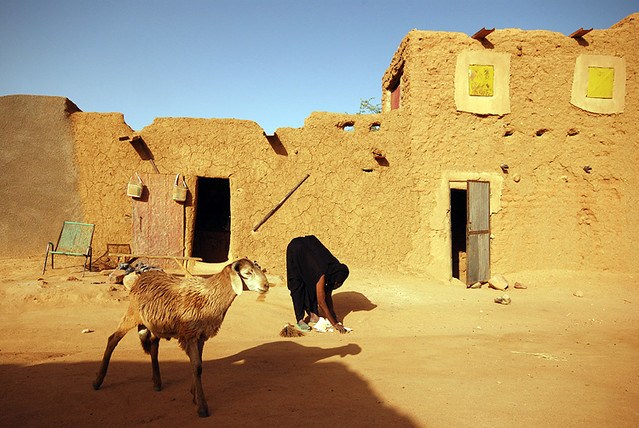
Above, houses from the Kidal region of northern Mali, where as you might tell good governance has not been part of the picture for a while. Paul Mutter sends in the latest on what's happening in the Sahel as international involvement increases.
Le Monde estimates that over 200,000 Malians have fled to neighboring countries in the wake of the ongoing "Tuareg rebellion," while at least 150,000 more have become international displaced persons. It is by now though, a misnomer to call this conflict a "Tuareg rebellion," as the MNLA, the Tuareg organization originally fighting to establish an autonomous homeland in northern Mali, has been driven from the cities it captured from the government. The government was driven from the north months before, and so the initiative is now in hands of the militias proclaiming Islamist goals.
Despite their superior armaments, MNLA fighters have now been driven from Gao which they had declared to be the capital of their autonomous state of "Azawad." Reporter Peter Tinti interviewed residents of Gao following the MNLA's departure from the city, offering insight into the Islamists' success:
The Islamists' "acceptance" seems to be less a matter of sincerity on the part of the "liberated" residents of Gao for "Les Mujadadin" than it is a hope that the past weeks of looting and arbitrary violence against civilians will subside. Neither the MNLA nor the Malian Army found themselves to be very popular as occupiers in the past few months because of their actions.
Indeed, success in Gao for the Movement for Unity and Jihad in West Africa (MUJWA) - an organization involved in bombings, smuggling and kidnappings in Algeria - and Ansar al-Dine, founded by the Tuareg Islamist and former MNLA commander Iyad Ag Ghali, did not just come militarily. It also came through through the fact that the Islamists accurately read street protests over the murder of a local official and their escalation against the MNLA occupation and Tuareg separatism in general. France24 reports that MUJWA and Ansar al-Dine quickly took up places alongside the demonstrators A spokesman for Ansar al-Dine claims that the Islamists, who do count Tuaregs among their numbers, "only" moved against the MNLA in order to prevent them from further brutalizing the city's residents.
Tuaregs are now reportedly vacating northern Mali in fear of further reprisals from all parties, while MUJWA is apparently trying to win over Mali's Songhai minority. At the same, all of the Islamist militias have reportedly begun imposing their versions of Sharia law in the towns they hold: a family interviewed by Phil Paoletta reports public floggings and other harsh measures have been instituted in Timbuktu, while throughout the north, armed gangs are descending upon Sufi shrines to tear them down.
Unpopular as these actions are proving to be, an even greater dearth of popular support bedeviled the MNLA since the onset of the fighting that saw Mali's US-trained armed forces retreating before separatist Tuaregs kitted out with stolen Libyan weaponry. It was no coincidence that these columns bore the arms of the Jamahiriya - the late Colonel was a patron of Tuareg separatism in Mali in the 1980s and 1990s, when severe droughts and resentment towards Bamako's policies sparked revolts. Representatives of Tuareg tribes eventually reached a ceasefire with the government in 1998, though clashes continued to occur on and off since then and disappointment with the central government - in both the north and among the military - has festered through that time. The returning mercenaries from Libya provided the means for the conflict to be reignited.
But as the shock of its assault wore out over Mali's geographic space and ethnic divisions, the Tuareg's position deteriorated (they account for no more than a fifth of Mali's total population, and many have since moved to the cities). The MNLA has been hurting for manpower and finances. Additionally, the several-thousand strong MNLA did not represent all Tuaregs. Splits within the movement among participating Tuareg tribes, such as the Kel Adagh, had weakened the separatists before the falling out with Ansar al-Dine occurred in Timbuktu.
The conflict's regional implications are still being calculated. Mauritania and Algeria are deploying more border units, and Mali's West African neighbors have proposed direct military intervention. Parliamentarians and protestors in Bamako are demanding that the army - still chastened from its losses and self-defeating coup against President Touré in the spring - take more proactive measures to regain government control over the north.
Finally, there is the matter of assessing how possible next steps in this conflict - further Islamist offensives, outside military intervention from ECOWAS, refugee movements, a government offensive - might affect a Sahelian food insecurity crisis warned of by aid organizations for this year. Oxfam warned in June that "[l]ow rainfall and water levels, poor harvests and lack of pasture, high food prices and a drop in remittances from migrants are all causing serious problems .... National food reserves are dangerously low, while prices of some key cereals have dramatically increased: prices of corn in the Sahel are 60-85% higher than last five year average prices." Water access issues in the north are being exacerbated by conflict-related disruptions. And between 70,000 and 100,000 refugees have gone to [Mauritania], where "700,000 people (over one-quarter of the population) in Mauritania are [already] estimated to be vulnerable to food insecurity." The World Food Program and other NGOs remain optimistic that international donors and the region's governments can remediate most of these problems, including in Mali, where Oxfam plans to provide food aid to around 350,000 people.
Update: For more information on Ansar al-Dine's Iyag Ag Ghaly, AFP's Serge Daniel has a profile of the Tuareg Islamist leader up at Slateafrique.com.


